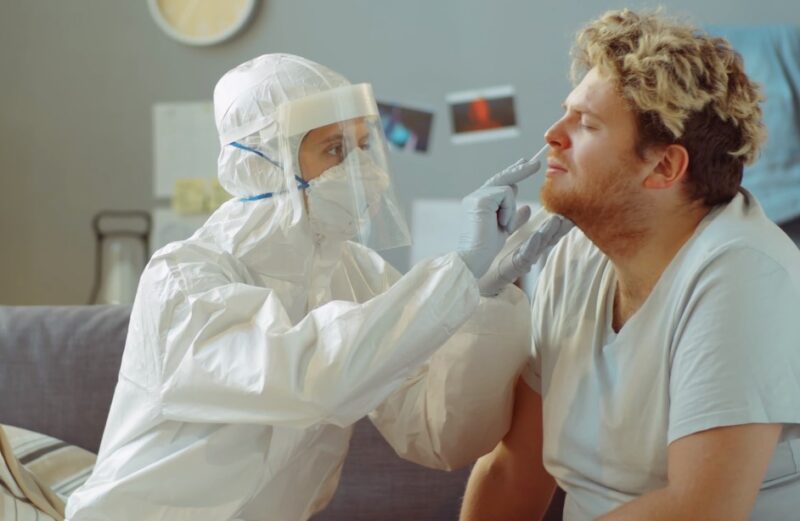The COVID-19 pandemic has been a global crisis like no other, affecting lives in unprecedented ways. From feeling the initial symptoms to getting a test, one question that often comes up is, “When should I go to the hospital for COVID-19?”
With new variants and changing guidelines, knowing when to seek medical help can be confusing. This blog post aims to offer a comprehensive guide, relying on updated research and expert recommendations, on when you should head to the hospital if you or someone you know is affected by COVID-19.
Symptoms and Basics You Must Know

When you first experience symptoms of COVID-19, it’s natural to feel anxious and consider rushing to the hospital. However, it’s crucial to understand the spectrum of symptoms that can occur with this disease. Recognizing the type of symptoms you have—whether mild or severe—can help you make an informed decision about when hospital care is necessary.
Mild Symptoms
Most people with COVID-19 will experience mild symptoms, and it’s often manageable without hospital intervention. These symptoms may include:
- Fever or chills
- Cough
- Shortness of breath or difficulty breathing
- Fatigue
- Muscle or body aches
- Headache
- Sore throat
- New loss of taste or smell
- Congestion or runny nose
- Nausea or vomiting
If you experience these symptoms, it is generally advised to self-isolate at home, inform close contacts, and consult your healthcare provider for further guidance. However, mild symptoms can progress to severe ones, so it’s vital to monitor your condition regularly.
Severe Symptoms
When symptoms escalate, immediate medical intervention is often required. Severe symptoms include:
- Trouble breathing
- Persistent chest pain or pressure
- Confusion
- Inability to wake or stay awake
- Bluish lips or face
If you notice any of these severe symptoms in yourself or someone else, it’s imperative to seek emergency medical help right away. These symptoms can indicate a critical condition that may require advanced medical treatment, including oxygen therapy or mechanical ventilation.
Monitoring Symptoms at Home

Managing mild symptoms at home is often feasible, but it requires a disciplined approach. You’ll need to keep an eye on your symptoms and possibly even some vital signs. Here, we’ll discuss a couple of ways you can effectively monitor your condition at home.
The Importance of a Pulse Oximeter
A pulse oximeter is a simple device that clips onto your fingertip and measures your blood oxygen levels. Normal readings usually range from 95 to 100 percent. A reading below 92 percent is a cause for concern and warrants immediate medical attention.
Having a pulse oximeter at home can help you monitor one of the crucial aspects of COVID-19—your blood oxygen level. A declining oxygen level is a significant red flag and may require medical intervention. It can also provide a more concrete basis for going to the hospital, aside from how you’re feeling subjectively.
When Home Care Isn’t Enough
Some people start with mild symptoms but see them worsen over time. If you’ve been managing symptoms at home and notice they’re becoming severe—or if your pulse oximeter readings drop below the safe range—this is the time to go to the hospital.
At home, you should also watch for signs of dehydration, uncontrolled fever, and worsening shortness of breath. If you find it increasingly hard to perform daily activities or note a decline in your general well-being, consult your healthcare provider immediately for guidance on whether hospitalization is needed.
When to Call 911

In some situations, waiting or driving to the hospital is not an option. Here, we’ll discuss immediate red flags that should prompt you to call 911 without delay.
Immediate Red Flags
The following symptoms are urgent and should never be ignored:
- Severe trouble breathing
- Persistent chest pain or pressure
- Sudden confusion
- Bluish lips or face
- Seizures
- Unresponsiveness
If you or someone you know is experiencing any of these symptoms, call 911 immediately. These are signs that the condition is critical and demands urgent medical intervention.
Transporting to the Hospital
When you call 911, be sure to inform the dispatcher that the patient has or may have COVID-19. This allows them to alert the receiving hospital for appropriate precautions. Emergency medical services (EMS) have protocols for dealing with COVID-19 patients to minimize the risk of transmission.
Remember that in a severe or rapidly worsening condition, time is of the essence. Waiting to get to the hospital can result in irreversible damage or even be life-threatening. Always err on the side of caution when experiencing severe symptoms.
Factors Influencing Hospitalization

Certain groups of people are at higher risk for severe illness from COVID-19. Recognizing if you belong to one of these high-risk groups can inform your decision about seeking hospital care.
High-Risk Groups
People at high risk for severe illness include:
- Those aged 65 or older
- Pregnant individuals
- Individuals with weakened immune systems
- People with underlying health conditions, such as diabetes, heart disease,, or obesity
If you belong to any of these high-risk groups and experience COVID-19 symptoms—even mild ones—it’s important to consult healthcare professionals early on for tailored advice.
Comorbidities
Having other health conditions in addition to COVID-19 can complicate the picture. Comorbidities like asthma, COPD, heart disease, or diabetes can exacerbate COVID-19 symptoms and increase the risk of severe illness.
In such cases, it’s essential to maintain regular communication with your healthcare providers to determine the best course of action, which may include hospitalization even for seemingly mild symptoms. This can be crucial for ensuring optimal outcomes and preventing complications.
Bonus Tips: Preparing for Hospitalization

Getting ready for a possible hospitalization during the COVID-19 pandemic requires a unique set of preparations. You’ll need to account not only for the usual medical necessities but also for strict isolation and infection control protocols. Here are some bonus tips on how to prepare.
What to Pack
If you or a family member are headed to the hospital due to severe COVID-19 symptoms, it’s wise to pack a small bag in advance. Consider including the following items:
- Face masks: Multiple masks are essential for anyone accompanying the patient.
- Personal identification and medical insurance cards: Vital for admission and medical history.
- Medications: Any current prescriptions, ideally in their original bottles.
- Personal items: Things like eyeglasses, hearing aids, or other daily necessities.
- Mobile charger: Communication with family and healthcare providers will be crucial.
Remember that COVID-19 protocols may limit what you can bring into the hospital, so keep it simple and essential.
Pre-Admission Protocols
It’s advisable to call the hospital ahead of time to inform them you’re coming and to get information on their COVID-19 protocols. This will allow the healthcare team to guide you through the safest way to enter the hospital and help ensure that isolation procedures are followed from the start.
It’s also crucial to inform close contacts and family members, ensuring that anyone who may have been exposed takes appropriate precautions as well. This can help reduce the risk of further transmission.
Navigating Hospital Care

Once you’re in the hospital, you’ll find that COVID-19 has changed many standard procedures. Here’s what you can expect and how to navigate these changes effectively.
Safety Measures and Visitor Policies
Hospitals have implemented rigorous safety measures, including strict visitor policies. In most cases, COVID-19 patients are not allowed to have visitors to minimize the risk of spread. Make sure to stay in communication with healthcare providers and loved ones through virtual means.
Also, you can expect to see hospital staff wearing enhanced personal protective equipment (PPE). Don’t be alarmed; this is an essential part of keeping both patients and healthcare providers safe.
Discharge and Post-Hospital Care
Being discharged from the hospital doesn’t necessarily mean you’re entirely free of COVID-19. You’ll need to follow specific guidelines for continuing your recovery at home. This will often involve a period of isolation and possibly further telehealth consultations with healthcare providers.
It’s essential to understand and follow all post-discharge instructions closely. These guidelines are designed to ensure not only your recovery but also the safety of everyone around you.
FAQs
How long should I self-isolate before considering going to the hospital?
The duration of self-isolation depends on your symptoms and their severity. For mild symptoms, the general recommendation is to self-isolate for at least 10 days from the onset of symptoms and until you’ve been fever-free for at least 24 hours without the use of fever-reducing medications.
If your symptoms worsen or become severe during this period, seek medical advice immediately to determine whether hospitalization is needed.
Can I go to any hospital, or do I need to go to a specific COVID-19 treatment center?
It’s essential to consult your healthcare provider or local health department for guidance on the most appropriate facility for your situation. Some hospitals are better equipped to handle COVID-19 cases, and certain facilities may be designated as specialized COVID-19 treatment centers.
Always call ahead to inform the hospital that you’re coming and to inquire about any specific procedures you’ll need to follow.
What should I do if I’m experiencing symptoms but can’t afford a hospital stay?
If you’re experiencing severe symptoms, it’s crucial to seek medical attention regardless of your financial situation. Some hospitals provide charity care programs, and federal funding has been allocated to help cover COVID-19 treatment costs for uninsured patients in certain cases.
Discuss your financial concerns with the hospital’s billing department or social work services to explore available options.
Should I drive myself to the hospital if I have severe symptoms?
If you’re experiencing severe symptoms like difficulty breathing, persistent chest pain, or any other urgent signs, it’s recommended to call 911 rather than drive yourself.
Emergency medical services (EMS) can provide immediate medical care en route to the hospital, which could be critical in severe cases.
What tests should I expect at the hospital?
Upon arrival with suspected COVID-19, you will likely undergo a range of tests to assess your condition. These may include a PCR or rapid antigen test for COVID-19, blood tests to check for infection markers, chest X-rays or CT scans to evaluate lung condition, and possibly an electrocardiogram (ECG) to assess heart function.
The exact tests will depend on your symptoms and medical history.
Will I be separated from my family if I have to be hospitalized?
Yes, due to the infectious nature of COVID-19, hospitals have strict isolation protocols to minimize the spread of the virus. This generally means that you will be in a separate room, and visitors are often not allowed or extremely limited.
Virtual communication is usually the alternative for keeping in touch with family and loved ones during the hospital stay.
Final Words
The decision to go to the hospital for COVID-19 is complex and depends on various factors, including symptom severity, underlying health conditions, and risk factors for severe illness. With COVID-19, situations can escalate quickly, making timely intervention essential.
Always consult healthcare providers for personalized advice and, when in doubt, err on the side of caution. Knowing when to seek medical intervention could mean the difference between a manageable illness and a life-threatening condition.
Stay informed, remain vigilant, and take appropriate action as needed. After all, it’s better to be safe than sorry.
